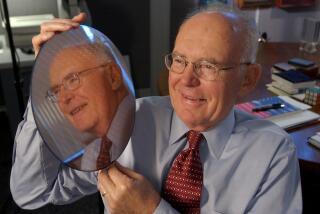Shared Nobel Prize for Transistor Discovery : Researcher Walter H. Brattain, 85
- Share via
Walter H. Brattain, whose co-discovery of the transistor brought him both some small regret and the 1956 Nobel Prize in physics, died Tuesday of the complications of Alzheimer’s disease.
He was 85 and died in a Seattle convalescent home.
Brattain, John Bardeen and William Shockley, all research scientists at Bell Telephone Laboratories at Murray Hill, N.J., shared the physics prize for their research in semiconductors and the discovery of the transistor effect in 1947. Shockley later became known for his controversial theories on genetics.
Their research gave birth to modern electronics, revolutionizing technologies in space exploration, satellite communications and computers. It led to the transistor radio and improved television and telephone service.
However, in a 1980 interview with United Press International, Brattain said, “The lone regret I have about the transistor is its use for rock ‘n’ roll music.”
He also revealed that his discovery was pure chance. That he was in the right place at the right time.
That July day in 1947 he and his colleagues at Bell were using a tiny wafer of treated germanium (a common element used in the electronics industry) with two close-point gold contacts on one side and a large normal contact on the other.
Realized the Significance
The transistor was used as the amplifier in place of an electron tube in a communications circuit and unexpectedly proved to be a significant breakthrough.
“On the way home that night,” he recalled in 1980, “I told the other riders in our car pool that I had probably taken part in the largest experience I would ever have.”
Nine years later Sweden’s King Gustav VI conferred the Nobel Prize on Brattain, Bardeen and Shockley.
Brattain became an international celebrity whose mailbox at Whitman College in Walla Walla, Wash., was filled with requests from publishers for books on the transistor and with requests from youngsters for autographs.
Brattain received a bachelor’s degree from Whitman in 1924 and graduate degrees from the Universities of Oregon and Minnesota. He went to work for Bell in 1929 as a research physicist and retired in 1967. He also had been a visiting lecturer at Minnesota, the University of Washington and Harvard University before returning to Whitman.
At first Brattain said he was pleased that the transistor had led to small radios where “people in Iran, people in the Indies, people living under dictatorships could listen to news from the United States and really know what was happening.”
But the later development of larger radios with their omnipresent tape decks offended his sensibilities.
“I still have my rifle,” he said late in his life. “And sometimes when I hear that noise (rock ‘n’ roll), I think I could shoot them. . . . “
More to Read
Sign up for Essential California
The most important California stories and recommendations in your inbox every morning.
You may occasionally receive promotional content from the Los Angeles Times.











